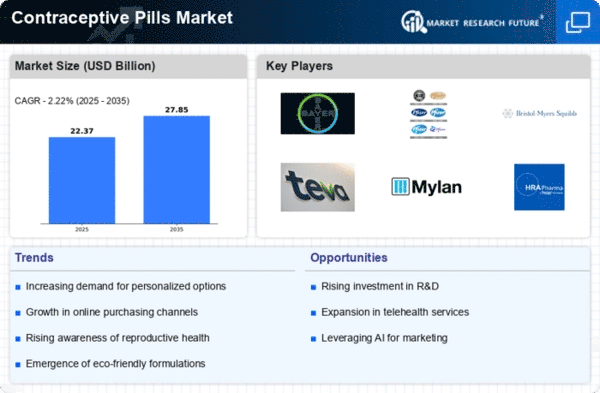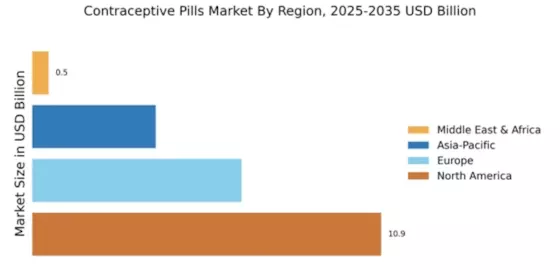In the Contraceptive Pills Market, recent developments have shown a notable increase in demand driven by growing awareness regarding family planning and reproductive health. In October 2022, Bayer launched a new contraceptive pill aimed at providing better tolerability and reduced side effects, showcasing innovation in product offerings. Additionally, in February 2023, Merck and Co. reported an increase in sales attributed to their contraceptive portfolio, reflecting a favorable market environment.
Current affairs highlight significant advancements in Research and Development, as companies like Novartis and Teva Pharmaceutical Industries focus on developing combination therapies to offer enhanced efficacy. On the mergers and acquisitions front, in March 2023, Pfizer announced the acquisition of HRA Pharma, which is expected to strengthen its position in the contraceptive domain.
Growth in market valuation has been observed, with companies like Johnson and Johnson and AbbVie reporting increased revenues due to their expanding contraceptive product lines. Over the past few years, changes in regulations and increases in government funding for reproductive health initiatives have further impacted the market, signaling a robust growth trajectory moving forward.
Contraceptive Pills Market Drivers
Increasing Awareness about Reproductive Health
The Contraceptive Pills Market is expanding significantly worldwide due to increased knowledge of family planning and reproductive health. World Health Organization research found that over half of women in their reproductive years are now aware of the many forms of contraception, including tablets. Numerous health groups, including Planned Parenthood and the United Nations Population Fund, have launched educational efforts that highlight the significance of regulating fertility and avoiding unwanted births, which have helped raise awareness of this issue. More women are trying to take control of their reproductive health, which is increasing the demand for contraceptive tablets.
The Contraceptive Pills Market is bolstered by government programs that support sexual and reproductive rights, such as the Global Strategy for Women's, Children's, and Adolescents' Health, which has set ambitious goals to guarantee access to family planning services. This is because family planning is a part of many countries' health agendas.
Technological Advancements in Pharmaceutical Development
The Contraceptive Pills Market Industry is positively impacted by the rapid technological advancements in pharmaceutical development. Recent innovations, such as the development of combination contraceptive pills with enhanced effectiveness and fewer side effects, are driving growth in the market. The U.S. Food and Drug Administration has approved new formulations that have improved efficacy rates against unintended pregnancies.
These advancements foster not only greater consumer confidence but also openness to the product.Additionally, multi-national pharmaceutical companies like Bayer and Pfizer are investing heavily in Research and Development to create next-generation contraceptive pills, which is facilitating market growth and expanding the range of available options for consumers.
Government Initiatives to Promote Family Planning
Various governments across the globe are implementing initiatives to promote family planning as part of public health strategies, thereby supporting the Contraceptive Pills Market Industry. For instance, programs spearheaded by the Indian government aim to achieve a significant reduction in population growth rates, which directly translates to increased promotion and distribution of contraceptive methods, including pills.
According to government statistics, India has seen a 20% increase in contraceptive usage over the last five years as a result of these initiatives.Such comprehensive public health policies, along with funding from international bodies like the World Bank, are driving demand for contraceptive pills, ensuring that more women have access to reliable birth control methods.
Contraceptive Pills Market Segment Insights
Contraceptive Pills Market Type Insights
The Contraceptive Pills Market is diversely segmented by Type, comprising Combined Oral Contraceptives, Progestin-Only Pills, and Emergency Contraceptive Pills Market, each holding a significant portion of the market. In 2024, the overall values are expected to highlight that Combined Oral Contraceptives generate a valuation of 11.0 USD Billion, which reflects their dominance and popularity, as they are considered the most effective type of contraception.
With an expected increase to 15.0 USD Billion by 2035, it underscores their essential role in reproductive health management and family planning initiatives globally, making them a preferred choice for many women.Progestin-Only Pills, valued at 5.0 USD Billion in 2024 with a growth projection reaching 7.0 USD Billion in 2035, are gaining traction as they cater specifically to women who may not tolerate estrogen, thus widening the accessibility of contraceptive options. The emergence of these pills addresses the need for safer alternatives, contributing to a significant part of the Contraceptive Pills Market revenue.
Meanwhile, Emergency Contraceptive Pills Market, which are valued at 4.03 USD Billion in 2024 and projected to rise to 6.0 USD Billion by 2035, play a critical role in emergency contraception, providing women with timely options after unprotected intercourse or contraceptive failure, thus highlighting the importance of accessibility to various contraceptive solutions.The market growth is propelled by rising awareness of family planning, coupled with the increasing need for contraceptive solutions tailored to individual health needs, which enhances adoption rates across different demographics.

















